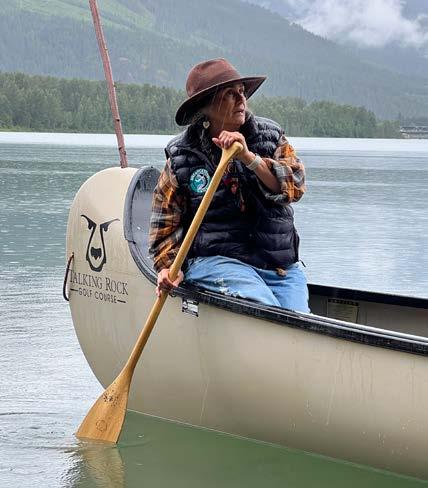
4 minute read
ARE ACCESSING THE FOOD BANK IN REVELSTOKE
FOOD COSTING IN B.C. 2022 REPORT HIGHLIGHTS INADEQUATE INCOMES AS THE ROOT CAUSE OF HOUSEHOLD FOOD INSECURITY
By Melissa Jameson
The Community Connections Food Bank says it is seeing an increasing number of people accessing its services.
“We are experiencing a huge demand at the food bank – more clients in total, and those clients are visiting more often. Additionally, donations have decreased while our food costs are also increasing. More folks need help with food, and less folks have extra to donate,” Melissa Hemphill, co-director of Community Outreach and Development at Community Connections wrote in an email to media. “It’s not a great financial situation and any help that community groups or individuals can give is very appreciated at this time (and always).”
In B.C., food banks do not receive core funding, and often rely on public donations and small grants to provide individuals and families with nutritious foods.
Hemphill’s appeal for donations comes on the heels of a recently released BC Centre for Disease Control (BCCDC) report on food costs across the province. The Food Costing in BC 2022 report, released in May 2023, assessed the affordability of healthy eating for individuals and families across all four regional health authorities. The report revealed the provincial average between May 2022 and June 2022 was $1,263 for a family of four (defined as “consisting of a male adult, a female adult, male child, and female child”). The average cost to feed a family of four in the Interior Health Region was $1,264.
“The purpose of the Food Costing in B.C. 2022 report is to highlight that inadequate incomes are the root cause of household food insecurity,” Linda Boyd, Public Health Dietician with Interior Health wrote in an email. The report, which reviewed five different household compositions and income scenarios, revealed many people and households living on low incomes – particularly those on income or disability assistance – cannot afford a nutritious diet after paying rent.
To learn more about how you can support the food bank in Revelstoke visit community-connections.ca/get-involved.

The Columbia Shuswap Invasive Species Society celebrated its 10th anniversary in mid-June. The Columbia Shuswap Invasive Species Society (CSISS) is a non-profit organization dedicated to the prevention, management, and reduction of invasive species on the Columbia Shuswap Regional District.

“This significant milestone marks a decade of dedicated efforts to protect ecosystems in the region from threats posed by invasive species,” the society said in a statement. CSISS was established in 2013 and is part of a network of 13 regional invasive species groups in the province. The groups work in cooperation with the Invasive Species Council of BC.
The society held its milestone celebration on June 15. The event featured a presentation on invasive species by CSISS technician Nolan Novotny, and a nature walk – which included a stop at an interactive boot brush station installed on the Revelstoke Greenbelt --led by outreach coordinator Jess Both. In its statement, CSISS said the celebration was an “opportunity to honour the contributions and commitments of past and current staff and board members, key partners, funders and volunteers.” Awards were presented to recognize the contributions of individuals who have played a pivotal role in the society’s success over the past decade.
Columbia Shuswap Invasive Species Society Turns 10
ESTABLISHED IN 2013, CSISS IS PART OF A NETWORK OF INVASIVE SPECIES GROUPS IN BC
By Melissa Jameson
“Since its inception, CSISS has made progress in tackling invasive species and their impact on our natural environment. Through collaboration, education, and onthe-ground initiatives, we have been working to preserve the delicate balance of our local ecosystems. Our achievements are the product of the dedication of our staff, board members, and the support of the community and funders.”
The society has created priority invasive plant lists, which can be found on its website columbiashuswapinvasives.org. High priority invasive plants identified in Revelstoke include Bighead knapweed, giant hogweed, nodding thistle, plumeless thistle, poison hemlock, scotch thistle, wood sage,
B.C. GOVT PLANS HIGHWAY REST STOP UPGRADES
UPGRADE ANNOUNCED, BUT WHEN ASKED, GOVERNMENT OFFICIALS SAID PLANS ARE PRELIMINARY WITH FEW DETAILS YET
By Revelstoke Mountaineer staff
In May, the B.C. government announced it was planning upgrades at the rest stop on the Trans-Canada Highway just west of the Revelstoke Bridge.

Currently, the rest stop is in poor shape: The blacktop is aged with giant pot holes, and the facility features ridimentary outhouses, some garbage cans and some cobra lights. It serves as a rest stop and is also key during highway closures, when it is used to store vehicles. It varies by season, but the rest stop is sometimes home to people living out of their camper vehicles.
Following the announcement, revelstokemountaineer.com followed up with the Ministry of Transportation for details, but the ministry provided few details, saying it was still in early stages.
We asked about scope, cost and schedule for the planned upgrades: "The project is in the early stages of development and does not yet have a defined scope, cost or schedule," a ministry spokesperson responded.
We asked if "new lighting, paving, toilets, physical expansion, or other facilities not currently in the area [are] planned?" In response, the ministry spokesperson said, "Improvements under consideration include improved washroom facilities, optimizing traffic flow and increased space for both commercial and private vehicle parking. However further planning is needed before details can be confirmed as we need to thoroughly assess the property to understand the available footprint."
When asked how residents could engage with the project, the spokesperson said it would be consulting with the City of Revelstoke, BC Trucking Association, Commercial Vehicle Safety and Enforcement "and others not identified yet in these early stages."
The spokesperson said that once preliminary planning had been done, the province would create a project webpage.










